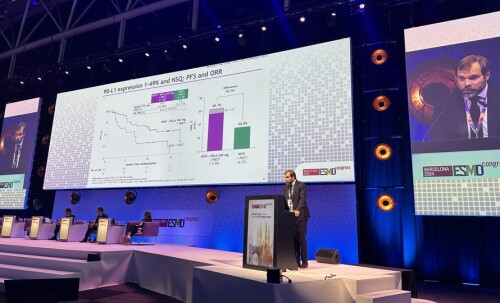This is an opportunity for Institut Curie to present and discuss its promising work, particularly for patients with breast and gynecological cancers, and especially those with the poorest prognosis.
“As evidenced every year by attendance at the ASCO congress, the dynamism and progress of global oncology are indisputable. However, there are still many challenges to be met in order to detect cancer ever earlier, personalize treatments and develop the best strategies for patients. All the more so in a context where the WHO is predicting a 77% increase in cancer cases by 2050”, says Prof. Steven Le Gouill, Director of Institut Curie Hospital Group. “Among European countries, France excels in cancer treatment, and I'm proud of Institut Curie teams involved in therapeutic innovation in oncology.”
|
KEY POINTS Breast cancer / > Anticipating relapse, personalizing treatment, testing new molecules: three promising breast cancer clinical trials supported by Institut Curie > Imaging and AI: a predictive model to personalize management of triple negative breast cancers
Gynecological cancers / Ovarian cancer: a drug-conjugated antibody effective in elderly women
Lung cancer / Precision medicine: a brand new targeted therapy for non-small cell lung cancer
Solid cancers / New class of drugs tested in humans for the first time |
BREAST CANCER
“As Europe's leading breast cancer treatment center, Institut Curie boasts world-renowned expertise in this field. We participate in and coordinate a number of large-scale clinical trials to contribute to therapeutic advances in breast cancer, particularly in the most aggressive forms. Through the commitment of our teams and particularly active research, our aim is to offer the best possible care and access to innovation, guaranteeing the best treatments for our patients” , says Prof. François-Clément Bidard, medical oncologist and coordinator of breast cancer research at Institut Curie hospital.
> Anticipating relapse, personalizing treatment, testing new molecules: three promising breast cancer clinical trials supported by Institut Curie
During a session dedicated to the clinical trials to follow, Institut Curie will be presenting three ground-breaking studies in the treatment of breast cancers, in particular the most aggressive of them, known as triple-negative. In these new trials promoted by Institut Curie and currently open to participation, the detection and evaluation of circulating biomarkers plays an important role, a field in which Institut Curie's expertise is recognized worldwide.
-
- CUPCAKE: early detection of relapse in triple negative breast cancer
Based on Institut Curie's pioneering work on liquid biopsies of circulating tumor DNA, CUPCAKE is a large-scale, randomized, multicenter study involving 450 patients with triple negative breast cancer at high risk of relapse. The aim of this trial is to evaluate the efficacy of circulating tumor DNA detection coupled, in the event of detection of a blood signal of relapse, with whole-body PET/CT (positron emission tomography - computed tomography) imaging using a new radiotracer, 68Ga-FAPI (which marks fibroblasts associated with cancer), which is highly promising for triple negative cancers compared with the conventional tracer (18F-FDG). The aim of this study is to offer patients rapid therapeutic management when relapse is limited both in size and number of metastases. The first results are expected in 2027.
- ECLECTIC: Personalizing treatment with liquid biopsies in hormone-dependent breast cancer
ECLECTIC is a Phase 3 trial designed to demonstrate the value of circulating tumor cells (CTCs) coupled with PET/CT imaging using 18F-fluoro-oestradiol (FES) as a tracer, in guiding 2nd-line treatments - chemotherapy or hormone therapy - in hormone-dependent metastatic breast cancer. Previous research at Institut Curie has shown that the level of circulating tumor cells indicates the aggressiveness of the cancer, and can therefore help to choose between a more mild (hormone therapy) or more intense (chemotherapy) treatment. 18F-FES-PET/CT, on the other hand, enables real-time, non-invasive assessment of the hormone dependence of tumor lesions throughout the body, making it possible to predict resistance to hormone therapy - and therefore benefit from chemotherapy.
- TOPOLOGY: testing the efficacy of a new chemotherapy agent
For the first time in breast cancer, a Phase 2 study will investigate and evaluate the efficacy of PLX-038, a new drug, in patients with triple negative breast cancer who have already resisted several conventional treatments. PLX038 consists of a chemotherapy (SN38) already known to be active in these cancers, coupled with a kind of “vehicle” (PEG) that enables optimal penetration into tissues and prolonged tumor exposure to SN38. Such properties suggest that this new chemotherapeutic agent will have enhanced, long-lasting anti-tumor activity. The TOPOLOGY study will investigate the efficacy of this treatment, its safety and the biomarkers that can predict this efficacy. If the results are conclusive, a larger-scale study will be carried out to compare this innovative agent with current treatments.
Find references by downloading press release
> Imaging and AI: a predictive model to personalize management of triple negative breast cancers
For almost 3 years now, the standard treatment for triple negative breast cancer has been modified. Indeed, the majority of patients had previously received chemotherapy prior to surgery (neoadjuvant). Today, it is a combination of chemotherapy and neoadjuvant immunotherapy that is most often administered, and which proves particularly effective when patients respond to treatment. At Institut Curie, over 70% of patients receiving chemo-immunotherapy show a complete histological response (i.e. disappearance of disease from the breast and/or lymph nodes), a highly predictive factor for patient survival. However, chemo-immunotherapy is a treatment that can generate severe toxicities: there is a major challenge in identifying and predicting the response to this neoadjuvant treatment, in order to be able to spare this treatment for patients who will not benefit from it.
In this context, Dr. Toulsie Ramtohul, radiologist at Institut Curie, has carried out a radiomic analysis involving the use of certain imaging features to design a predictive model of response to neoadjuvant treatment, using mathematics and AI. In strict compliance with current regulations on data use, MRI scans of almost 200 patients have provided essential data on tumor heterogeneity, a property that correlates well with tumor aggressiveness and resistance to treatment (the more heterogeneous the tumors, the more resistant they are). The results of this study show that advanced analysis of MRI data enables very early prediction of response to neoadjuvant treatment.
“Applied in the clinic, our model could help personalize the choice of treatment for patients with early-stage triple negative breast cancer: by reducing neoadjuvant treatments for patients whose tumors respond well, or conversely, by rapidly proposing therapeutic alternatives to those whose tumors do not respond. Results such as these open up the possibility of future therapeutic de-escalation studies, an extremely important issue for our patients” concludes Dr. Toulsie Ramtohul.
Find references by downloading press release
GYNECOLOGICAL CANCERS
Ovarian cancer: a drug-conjugated antibody effective in elderly women
One year ago, the results of the Mirasol Phase 3 trial in platinum-resistant ovarian cancer were unveiled at ASCO. This is one of the forms of ovarian cancer with the poorest prognosis and hitherto limited therapeutic alternatives: the emergence of new therapeutic options is therefore crucial. These results demonstrated the major survival benefit, compared with standard chemotherapy, of a conjugated drug antibody, Mirvetuximab soravtansine (MIRV), in folate receptor alpha overexpressing ovarian cancers. Folate receptor overexpression is observed in 20-30% of platinum-resistant ovarian cancers.
Institut Curie, France's leading cancer recruiting center, took part in this study, and Dr. Diana Bello Roufai, Deputy Head of the Medical Oncology Department at Institut Curie, is presenting the results of a subgroup of the Mirasol study at this year's American congress: the population aged over 65. The results corroborate those obtained in the overall population, i.e. greater efficacy in terms of overall survival and response rate, combined with less toxicity than conventional chemotherapy.
“This molecule has become the first drug-conjugated antibody and a new therapeutic standard in the management of ovarian cancers. Institut Curie will continue the work and will soon coordinate - in collaboration with the GINECO academic group - a new trial with this drug-conjugated antibody in relapsed platinum-sensitive ovarian cancers", concludes Dr. Diana Bello Roufai.
Find references by downloading press release
LUNG CANCER
Precision medicine: a brand new targeted therapy for non-small cell lung cancer
In around 3% of non-small-cell lung cancers, tumor cells display an alteration in the HER2 receptor, which is responsible for their proliferation and the development of cancer. While expression of this receptor is well known to oncologists in breast cancers, its alteration is much rarer and less well known in lung cancers.
For the first time, a phase 1/2 study involving Institut Curie has tested the efficacy of an inhibitor capable of targeting HER2 in non-small cell lung cancer. The results, reported at ASCO by lung specialist Prof. Nicolas Girard, Head of the Medical Oncology Department at Institut Curie, show that the drug was well tolerated, with high response rates of around 70%: data in favor of further clinical development of this new drug.
“Our study demonstrates that molecular characterization is essential and must be pursued in order to develop targeted therapies that can bring real benefits to certain patient subgroups. Alongside immunotherapy, cell-based therapies, therapeutic vaccines and other innovations currently under development, it is essential to continue evaluating targeted treatments, particularly for the rarest situations not explored to date, and at all stages of the disease” says Prof. Nicolas Girard.
Find references by downloading press release
SOLID CANCERS
New class of drugs tested in humans for the first time
Cytokines are among the immune system molecules involved in the response against viruses, bacteria and tumor cells. Among these cytokines: interleukin 2 is an old therapy used in the treatment of melanoma or kidney cancer. However, its use was curtailed due to its high toxicity.
Today, MIT start-up dragonfly therapeutics, in collaboration with Institut Curie, has developed a completely new molecule: a modified interleukin 2 with a longer half-life. What's more, thanks to a specific mechanism of action that selectively activates immune system cells, administration of this modified IL2 should produce fewer side effects. For the very first time, this new molecule will be evaluated in humans in a Phase 1 study involving almost 100 patients with solid cancers, refractory to standard treatments and aged over 18.
“We are delighted that this first-in-man clinical trial is taking place in France and at Institut Curie. The start of this study is the fruit of collaborative research, and we look forward to gathering the first results from this new molecule” - says Dr. Emanuela Romano, medical oncologist, medical director of the Cancer Immunotherapy Center at Institut Curie.
Find references by downloading press release



